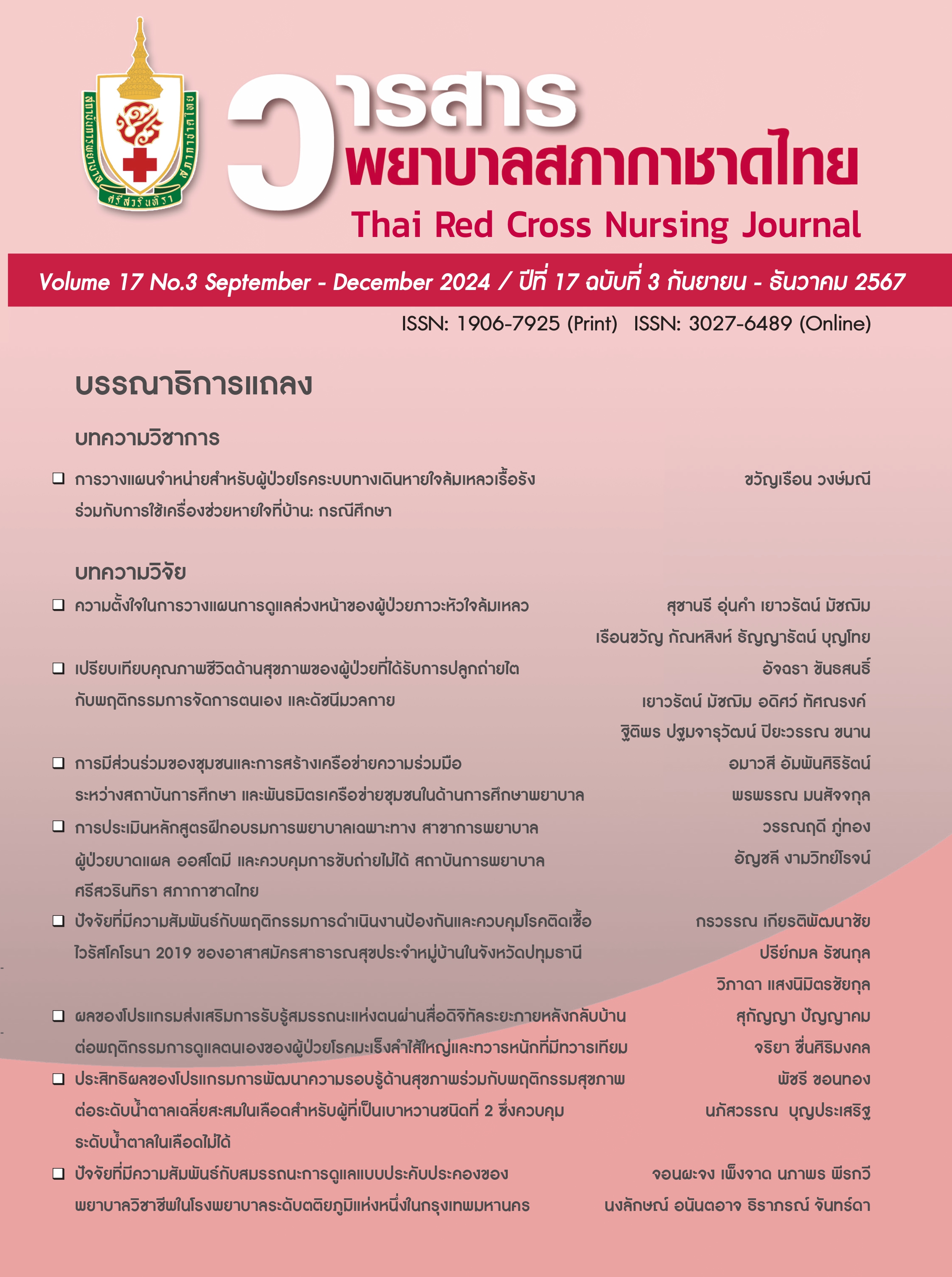การมีส่วนร่วมของชุมชนและการสร้างเครือข่ายความร่วมมือระหว่างสถาบันการศึกษา และพันธมิตรเครือข่ายชุมชนในด้านการศึกษาพยาบาล
คำสำคัญ:
การมีส่วนร่วมของชุมชน, เครือข่ายความร่วมมือ, การจัดการศึกษาพยาบาล, สถาบันการศึกษาบทคัดย่อ
การวิจัยเชิงคุณภาพแบบพรรณนานี้มีวัตถุประสงค์ เพื่ออธิบายกลไกการสร้างความร่วมมือและความรับผิดชอบและบทบาทหน้าที่ของภาคีเครือข่ายในการจัดการศึกษาหลักสูตรพยาบาลศาสตรบัณฑิต สถาบันพระบรมราชชนก ผ่านการมีส่วนร่วมของชุมชนระหว่างสถาบันการศึกษา ชุมชน และภาคีเครือข่ายสุขภาพ พื้นที่การศึกษาถูกคัดเลือกแบบเจาะจงจากวิทยาลัยพยาบาลในสังกัดคณะพยาบาลศาสตร์ สถาบันพระบรมราชชนก จำนวน 30 แห่ง วิทยาลัยพยาบาล 8 แห่งได้รับการคัดเลือก โดยพิจารณาจากความคิดริเริ่มการมีส่วนร่วมของชุมชนและความพยายามร่วมกันในการจัดการศึกษาพยาบาล ผู้เข้าร่วมประกอบด้วยกลุ่มผู้แทนจากสถาบันการศึกษาพยาบาล ผู้แทนโรงพยาบาลชุมชน โรงพยาบาลส่งเสริมสุขภาพตำบล องค์กรปกครองส่วนท้องถิ่น และกลุ่มผู้นำชุมชน รวม 103 คน เก็บรวบรวมข้อมูลระหว่างเดือนสิงหาคม พ.ศ. 2565 ถึง สิงหาคม พ.ศ. 2566 โดยใช้การสนทนากลุ่ม และการสัมภาษณ์กึ่งโครงสร้าง และวิเคราะห์ข้อมูลผ่านการวิเคราะห์แก่นสาระ
ผลการศึกษา แบ่งออกเป็นสองประเด็นหลัก ได้แก่ 1) กลไกการสร้างความร่วมมือระหว่างสถาบันการศึกษา เครือข่ายชุมชนและสาธารณสุขที่เกี่ยวข้องเพื่อส่งเสริมการจัดการศึกษาพยาบาล อธิบายได้ ดังนี้ 1.1) การพัฒนาผู้สอนให้พร้อมลงชุมชน 1.2) สอนให้ผู้เรียนเกิดการสะท้อนคิด และ 1.3) เชื่อมประสานกับชุมชน 2) บทบาทหน้าที่ของภาคีเครือข่ายที่เกี่ยวข้องในการมีส่วนร่วมจัดการศึกษาพยาบาล ได้แก่ การเป็นผู้ช่วยเหลือสนับสนุน
สรุปและข้อเสนอแนะ: การจัดการศึกษาพยาบาลที่มีประสิทธิผลต้องอาศัยความเข้าใจกลไกในการสร้างความร่วมมือและบทบาทของภาคีเครือข่าย การค้นพบนี้สามารถนำไปสู่การพัฒนาโปรแกรมการศึกษาและโครงการริเริ่มการมีส่วนร่วมของชุมชนที่ตอบสนองความต้องการของบุคคล ครอบครัว และชุมชนตลอดจนระบบสุขภาพ
เอกสารอ้างอิง
Kruahong S, Tankumpuan T, Kelly K, Davidson PM, Kuntajak P. Community empowerment: a concept analysis. J Adv Nurs 2023;79(8):2845-59.
Thongsom, Siriporn L, Hanbenjapong C. Graduated identity development process of colleges under Praboromaratchanok Institute Jurisdiction, Ministry of Public Health. Journal of Health Science of Thailand 2020;29(3):547-60. (in Thai)
Yapa L. Transforming the university through community engagement. JHEOE 2009;13(3):131-46.
Bidandi F, Ambe AN, Mukong CH. Insights and current debates on community engagement in higher education institutions: perspectives on the University of the Western Cape. Sage Open 2021;11(2). doi:10.1177/21582440211011467.
Badlis S, Poole E, Siegle H, Tyburski S, Lipman TH. Impact of engagement in the Community Champions program on clinical nursing practice. JNEP 2023;13(5):1-7.
Jacobs AC. The benefits of experiential learning during a service-learning engagement in child psychiatric nursing education. Afr J Health Prof Educ 2020;12(2):81-5.
Narsavage GL, Batchelor H, Lindell D, Chen YJ. Developing personal and community learning in graduate nursing education through community engagement. Nurs Educ Perspect 2003;24(6):300-5.
Schaffer MA, Hargate C. Moving toward reconciliation: community engagement in nursing education. J Community Engagem Scholarsh 2015;8(1):59.
Creswell JW, Creswell JD. Research design: qualitative, quantitative, and mixed methods approaches. 5th ed. Los Angeles: SAGE; 2018.
Braun V, Clarke V. Using thematic analysis in psychology. Qual Res Psychol 2006;3(2):77-101.
Nowell LS, Norris JM, White DE, Moules NJ. Thematic analysis: striving to meet the trustworthiness criteria. Int J Qual Methods 2017;16(1). doi: 10.1177/1609406917733847.
Ramsbottom A, O’Brien E, Ciotti L, Takacs J. Enablers and barriers to community engagement in public health emergency preparedness: a literature review. J Community Health 2018;43(2):412-20.
Anthony B, Jr. The role of community engagement in urban innovation towards the co-creation of smart sustainable cities. Journal of the Knowledge Economy 2024;15:1592-624.
Schiff DS, Lee J, Borenstein J, Zegura E. The impact of community engagement on undergraduate social responsibility attitudes. Studies in Higher Education 2023;49(7):1151-67.
Patel KM, Metersky K. Reflective practice in nursing: a concept analysis. Int J Nurs Knowl 2022;33(3):180-7.
Wichainate Kannika. Reflective thinking: teaching students to develop critical thinking in nursing practice. Journal of The Police Nurse 2014;6(2):188-99.
Magpantay-Monroe ER, Koka OH, Aipa K. Community engagement leads to professional identity formation of nursing students. Asian Pac Isl Nurs J 2020;5(3):181-4.
Wolfe N, Rubio-Diaz M, Garcia A, Calderon S, Kipke MD. 242 Listening to and Learning from the community: a model for community engagement and building trust. J Clin Transl Sci 2023;7(Suppl 1):74. doi: 10.1017/cts.2023.309.
Belita E, Carter N, Bryant-Lukosius D. Stakeholder engagement in nursing curriculum development and renewal initiatives: a review of the literature. QANE-AFI 2020;6(1):1-17. doi: 10.17483/2368-6669.1200.
Nuuyoma V, Makhene A. Community engagement in the faculty of health science: a concept analysis. Health SA 2020;25:1403. doi: 10.4102/hsag.v25i0.1403.
ดาวน์โหลด
เผยแพร่แล้ว
ฉบับ
ประเภทบทความ
สัญญาอนุญาต
ลิขสิทธิ์ (c) 2024 สถาบันการพยาบาลศรีสวรินทิรา สภากาชาดไทย

อนุญาตภายใต้เงื่อนไข Creative Commons Attribution-NonCommercial-NoDerivatives 4.0 International License.
เนื้อหาบทความหรือข้อคิดเห็นต่างๆ ในวารสารพยาบาลสภากาชาดไทยนี้ เป็นความคิดเห็นของผู้เขียนบทความ ไม่ใช่ความเห็นของกองบรรณาธิการ หรือสถาบันการพยาบาลศรีสวรินทิรา สภากาชาดไทย






